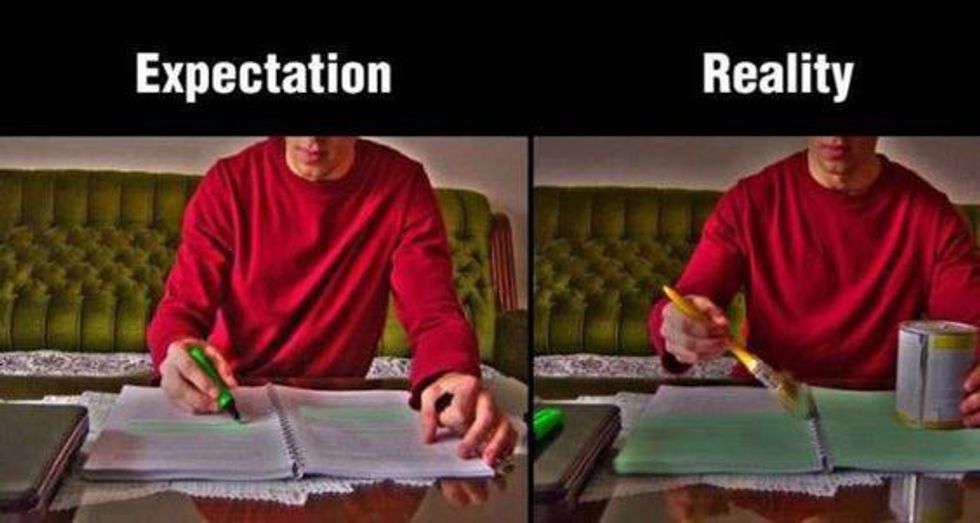Classes have started and so have those dreaded exams. They are inevitable and unavoidable so you just have to suck it up and prepare. How? Well, here are 10 tips on how to study for an exam that I have found to be the most useful:
First, you are given a study guide or textbook in each of your classes. Those aren't there for good looks. Use the study guide to identify the assigned textbook material. Matching what your teacher is looking for in the study guide or in your textbook, will make your exams that much easier to study for. Study guides usually identify the textbook material that will be covered on exams so you can safely assume the textbook material not covered on the study guides will not be covered on the exams.
Second, highlight the textbook material that is directly related to each item in the study guide. Highlighting has shown to be a way to identify and remember material from each chapter better. But just highlighting isn't going to be considered studying or retaining the material. It's just the first step to the process.Third, study the textbook material you highlighted and enough of the surrounding material that you understand the highlighted material. This means you shouldn't just highlight a sentence or words and that is the only sentence from that section of material you need to know. To fully understand what is going on, you need to study everything that is related to that highlighted part so you understand the concept completely.
Fourth, go back and REALLY study the textbook material. After you have read a section of the book and highlighted the important material, you haven't REALLY studied it. Passive reading, even combined with highlighting, involves very little mental processing. It does not lead to good retention. But once again, it begins your brain to START studying.
Fifth, study. At a minimum, studying consists of taking notes. Don't just copy things from the book or what your professor read aloud in class. While this is better than passive reading or listening, it still doesn’t require much mental processing. You need to study the material until you are able to understand what is going into your notes. It's mental processing, not simply the writing process, but retention. As an added bonus, your notes present the material in a different form and context than the textbook or your professor, so studying your notes will help you retain the information better.
Sixth, keep studying. There are different study techniques that are suited to different kinds of material. Draw diagrams. Diagrams can be especially effective ways of representing certain kinds of information because the mental effort required to summarize material to be put into an organized diagram will not only help you understand the material, it will help you recall the material during the exam. Make up examples from your own experience too. Studying includes generating examples of concepts. After you feel that you understand a concept, try making up an example. Examples from your own experience are best. And if that doesn't work, connect text material to something, even if it's nonsense. Making up an unusual or bizarre example is very effective. Examples that involve mental imagery are especially effective aids to recalling material during a test.
Seventh, practice. Effective studying includes retrieval practice. After you read about a concept and understand it well enough to write notes about it, try recalling what you have just learned without looking at either the book or your notes. A good way to do this is to write your notes on cards that you can use as flash cards to test your memory. Whether you are trying to memorize definitions of concepts or lists of points related to a concept, flash cards allow you to quickly go through a list of items, testing your ability to recall the information, and giving yourself immediate feedback. This type of mental processing is very effective in both storing information in memory and in retrieving information during an exam.
Eighth, review before you quit studying. End each study session with a review. You'll gain more from each study session if you spend some time reviewing what you covered. Even though this may take only a few extra minutes, it will help you retain the information you gained.
Ninth, go to the review session. Most professors offer a review session before each exam and some even have a Teaching Assistant or Graduate Assistant to help lead those. They help give you a different perspective or another review. If you feel like you don't need a review, at least go and listen to your classmates questions or ask your own for clarification. Some TA or GA's give you a perspective of how the professor words the questions on the exams or things to pay attention to (some may even give you an answer or two). These are essential and once again, not there for just good looks.
Tenth, attend class. None of this will do you any good unless you go to class to get those notes, study guide materials, hear your classmates questions, or find out when the review sessions will take place. Putting in the effort to at least attend class is the secret ingredient to putting in the effort to study. The professor makes the exams so if you don't attend class to find out their secret ways of doing things, it will show on your exam grade.












































